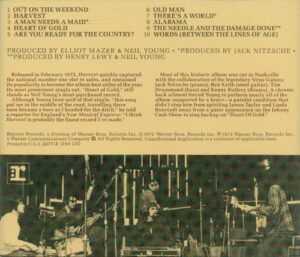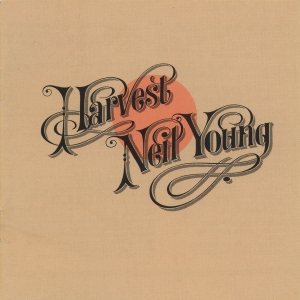“It’s Neil’s uniqueness, and his beautiful writing, so well-crafted and yet casual-sounding, and how he resonated with the Zeitgeist in subtle ways.”
Despite the obvious acclaim Linda Ronstadt has lavished upon it in later interviews, many critics were not to be so kind. Rolling Stone magazine at the time, stated dismissively that Neil Young’s much anticipated new album, Harvest, was nothing other than a, “disappointing retread of earlier, superior efforts by Young…” An album that they said, “withered in compassion to his earlier work”, especially that of Crosby, Stills, Nash and Young, pointing out the, “discomfortingly unmistakable resemblance of nearly every song on this album to an earlier Young composition…” It was, John Mendelsohn wrote, as if Young had, “just added a steel guitar and new words to After The Gold Rush.”
A review in The Montreal Gazette gave the album a mixed verdict, stating that whilst it was, “embarrassing“, in places, it was, at the very least, “interesting lyrically,” and singling out the track, ‘Are You Ready for the Country?’ as the record’s best offering.
The Village Voice critic Robert Christgau damned the, “mindless instant acceptance”, that he claimed, “made for critical overreaction when this came out, but,” he admitted, albeit reluctantly, “it stands as proof that the genteel Young has his charms… Rhythmically it’s a little wooden,” Christgau continued at the time, before adding that, “Young is guilty of self-imitation on ‘Alabama’ and pomposity on the unbearable London Symphony Orchestra opus ‘There’s a World’. But those two excepted, even the slightest songs here are gratifying musically,” Christgau admitted, “and two of them are major indeed – The Needle and the Damage Done and the much-maligned, A Man Needs A Maid.” In more recent years though, Harvest has come to be recognised as Neil Young’s best album, the album listeners must go to if they really want to understand why Neil Young is important to music. Harvest is a Country-inspired record that has truly stood the test of time, with readers of magazines such as Q and Uncut, and listeners to radio stations like Absolute Radio and Radio X annually voting it highly amongst the greatest albums of all time.
“There is a visual sense that envelopes the songs,” Stephen Stills once said of Neil Young and Harvest. “A sense that whatever is happening lyrically, whatever is going on and coming at you, through the speakers, there is a visualisation for people, that they can visualise the whole story in every sense.”
As the members of Crosby, Stills, Nash and Young finally split and began to wander separate paths, Neil Young decided to recruit Country session musicians to help record what would be his fourth solo studio album. It would feature the London Symphony Orchestra and boast special guest appearances by Linda Ronstadt and James Taylor, as well as David Crosby, Stephen Stills and Graham Nash. After its release, Harvest would top the Billboard 200 album chart for two weeks, spawn two hit singles, ‘Old Man’, which was dedicated to the janitor of Young’s new home, the Broken Arrow Ranch, and ‘Heart of Gold’, before going on to become the best-selling album of 1972 in the United States.
“I was at Neil’s ranch one day just south of San Francisco,” Graham Nash revealed during an interview with Terry Gross, “and he has a beautiful lake with red-wing blackbirds. And he asked me if I wanted to hear his new album, Harvest. And I said sure, let’s go into the studio and listen.
“Oh, no. That’s not what Neil had in mind. He said get into the rowboat. I said get into the rowboat? He said, yeah, we’re going to go out into the middle of the lake. Now, I think he’s got a little cassette player with him or a little, you know, early digital format player. So I’m thinking I’m going to wear headphones and listen in the relative peace in the middle of Neil’s lake.
“Oh, no. He has his entire house as the left speaker and his entire barn as the right speaker. And I heard Harvest coming out of these two incredibly large loud speakers louder than hell. It was unbelievable. Elliot Mazer, who produced Neil, produced Harvest, came down to the shore of the lake and he shouted out to Neil: How was that, Neil? And I swear to god, Neil Young shouted back: More barn!”
Almost fifty years later, Young laughs about Nash’s recollections when asked about the incident by Sylvie Simmons for MOJO magazine. “I’m not sure, it was a long time ago – but the idea of ‘more barn’, people just thought that was really funny… and have a good time with it.” Nash would later lay down backing vocals on the album along with Taylor, Ronstadt and former bandmate David Crosby.
Young was, as Nash revealed later, “the strangest of my friends”.
“Neil needs us about as much as a stag needs a coat rack,” Crosby is said to have commented dryly after being asked about his contribution on several of the tracks.
“Neil’s an interesting guy,” he told the webzine Ultimate Classic Rock, in May 2021. “He loves song. He loves music. He loves to sing and play. That part, there’s no complexity, there’s no tricks, there’s no weirdness at all. He is a musician. He loves it. As soon as his fingers touched the guitar strings, we were talking to each other really well. The chemistry… when we were playing, was excellent. We were listening to each other and we could spark each other easily.”
“I remember hearing ‘Heart Of Gold’ for the first time,” the album’s producer Elliot Mazer told Uncut. “Neil played the song in the control room on guitar. Kenny [drummer, Kenny Buttrey] and I looked at each other and we each put up one finger to show that we felt it would be a No.1. From that point on, it was easy,” he recounts.
The single ‘Heart Of Gold’ would be a massive hit, in spite of the critics’ initial lukewarm reactions, and would eventually go on to become something of an anthem for the singer.
“With Neil,” Mazer says recalling his time on Harvest, “his songs are worked out in advance and he plays them with great conviction and what he plays and sings dictates what the record should be. He is totally prepared,” Mazer quickly adds.
“I love Heart Of Gold,” Ronstadt tells MOJO. “From that opening chop-chop-chop guitar rhythm, you know it’s going to be a great song. But ‘Old Man’ was especially poignant for me.”
Neil Young talked about ‘Old Man’ for his film, The Heart Of Gold. “About that time, when I wrote ‘Heart Of Gold’, and I was touring, I had also—just, you know, being a rich hippie for the first time—I had purchased a ranch,” Broken Arrow Ranch. “And there was a couple living on it that were the caretakers, an old gentleman named Louis Avila and his wife Clara. And there was this old blue Jeep there, and Louis took me for a ride in this blue Jeep. He gets me up there on the top side of the place, and there’s this lake up there that fed all the pastures, and he says, ‘Well, tell me, how does a young man like yourself have enough money to buy a place like this?’ And I said, ‘Well, just lucky, Louis, just real lucky.’ And he said, ‘Well, that’s the darnedest thing I ever heard.’ And I wrote this song for him.”
“Where Neil was in his life, all of a sudden there is new fame,” as Ronstadt calls it, “and you don’t know what it means, friends treat you differently, you don’t know where you’re going, or how long it’s going to last, or if you’ll enjoy it anyway,” she wonders.
“I think Harvest is one of the best albums in American pop, or classic rock, maybe even Top 5,” Ronstadt opined to MOJO. “He just made music the way he was feeling, just what was on his mind, doing the same stuff that Neil always did.”
Harvest opens with the deceptively endearing ballad, ‘Out On The Weekend’.
“A gentle chug”, of an introduction Ultimate Classic Rock called the softly beguiling track, adding that the song’s tone belies a session band’s obvious Country origins and highlights a tuneful restraint. As Gary Gruff wrote for the webzine earlier this month, there were also warning signs, especially within the lyrics of a lost love left behind, that the ride ahead was not to be easy: warning signs that were to remain hidden for the moment by the album’s next song, the title track ‘Harvest’. A Country dance with a disarming tempo, Harvest, according to Uncut writer Graeme Thomson, has a “strangely hypnotic quality”, calming, almost tranquil in its delivery. Young himself is quoted as saying that ‘Harvest’ remains his favourite song on the album; whimsical, almost playful, despite the seemingly endless barrage of rhetorical questions towards that long lost love.
The veil is lifted and the album’s story is finally revealed to all, in ‘A Man Needs A Maid’, a song that was heavily criticised due to interpretations of chauvinism and misogyny: a charge that Young has repeatedly refuted, claiming that the much maligned song is, “just that. Just a song”. He later told the audience at a concert in Boston: “So don’t take it personally when I say it. I don’t really want a maid.”
Revealing Young’s insecurities, his fear of being hurt and deserted, A Man Needs A Maid makes reference to his lover at the time, Carrie Snodgrass:
“I was watching a movie with a friend / I fell in love with the actress.”
With Neil Young on piano and backed by the especially gathered session artists he had by now dubbed, The Stray Gators, ‘Are You Ready For The Country?’ has a punchy melody that dramatically contrasts the dark verses that hint of dread and a lurking sense of foreboding:
“I was talkin’ to the preacher / Said God was on my side / Then I ran into the hangman / He said it’s time to die”.
A few years later the song would be a massive hit for Country and Western legend, Waylon Jennings.
‘The Needle And The Damage Done’ is probably the most personal song on the album. Dark and harrowing, the pain-etched lyrics vividly describe the agonising effects that drug addiction was having on musicians Young had known, including his Crazy Horse bandmate Danny Whitten, who would die of a heroin overdose the year the song was released. Young has often claimed that Whitten was his “musical soulmate”.
“I felt responsible,” Young revealed in his biography, Neil Young: Long May You Run: The Illustrated History. “But really, there was nothing I could do. I mean, he was responsible. But I thought I was for a long time. Danny just wasn’t happy. It just all came down on him. He was engulfed by this drug. That was too bad. Because Danny had a lot to give. Boy. He was really good.”
Although dismissed at the time by some, and even thought of as “self-indulgent”, ‘The Needle And The Damage Done’ is now widely regarded as one of Neil Young’s most cherished and treasured songs, and is still regularly included in his live shows. Again it stands the test of time as a dark but deeply personal warning on the effects of drug abuse.
Young once commented: “Got to see a lot of great musicians before they happened, before they became famous… who nobody ever got to see, for one reason or another. But, strangely enough, the real good ones that you never got to see was… ’cause of heroin. An’ that started happening over an’ over. Then it happened to someone that everyone knew about. So I just wrote a little song.”

Harvest was released in Great Britain on 4th March, 1972. ‘Sugar Mountain‘ is not on the album but the link has been included because it was the B-side to ‘Heart Of Gold‘.




